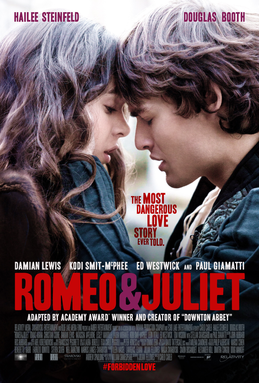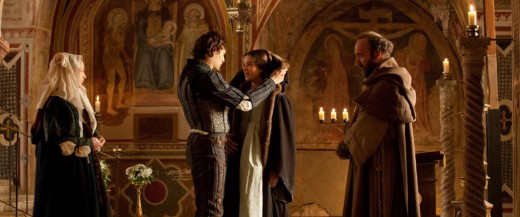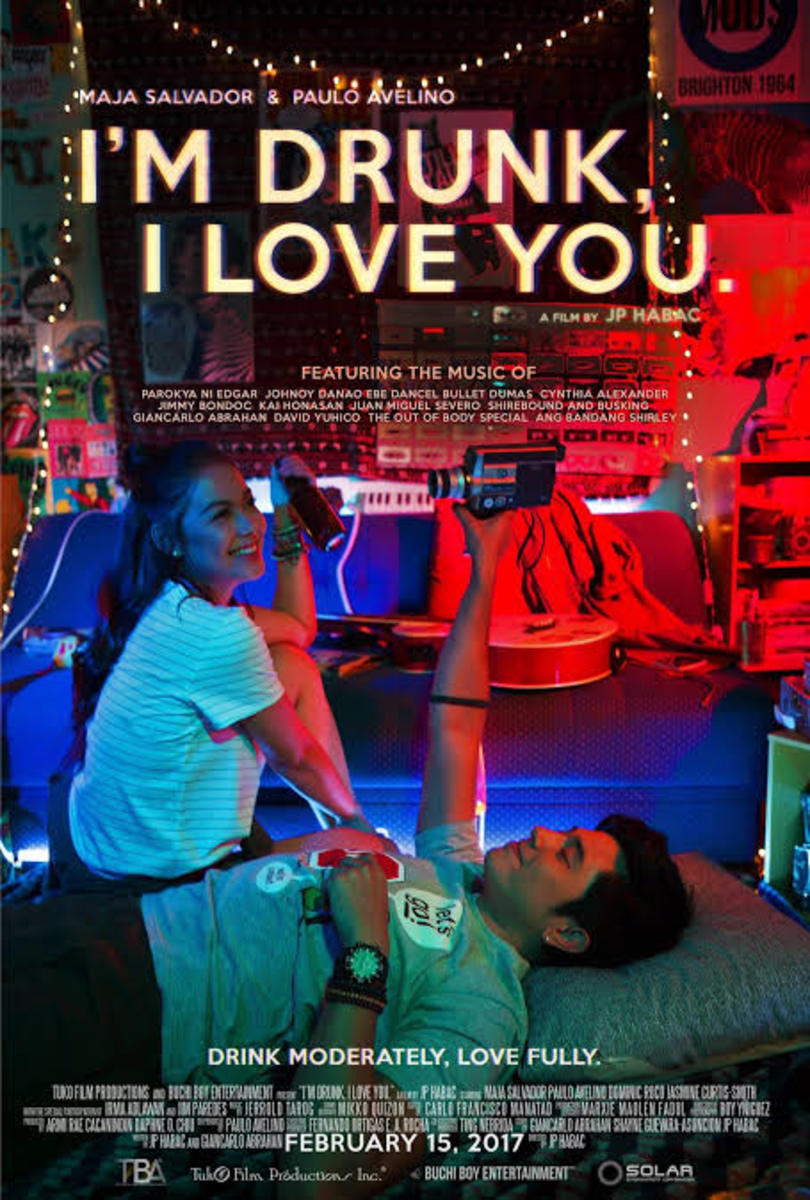WILL AND ME: Romeo and Juliet: Review of the Controversial 2013 Version

ROMEO AND JULIET: REVIEW OF THE CONTROVERSIAL 2013 VERSION
CAST: Douglas Booth, Hailee Steinfeld, Paul Giamatti, Lesley Manville, Christian Cooke, Ed Westwick, Damian Lewis, Natascha McElhone, Kodi Smit-McPhee, Stellan Skarsgård, Tom Wisdom, Nathalie Rapti Gomez, Laura Morante, Tomas Arana.
CREW:
Director— Carlo Carlei
Producers— Ileen Maisel, Nadja Swarovski & Julian Fellowes
Writers—Screenplay by Julian Fellowes; adapted from the play by William Shakespeare.
***
Many critics, all like in lack of dignity, on fair Rotten Tomatoes where we lay our scene. From arrogance break to overpaid salaries, where civil self-righteousness makes civil ignorance more noticeable. From forth the fatal lions of this league of loud-mouths, a talented screenwriter tries to introduce an old classic to a new generation. A writer whose hard work goes unnoticed because the abusers of freedom of speech pretend to know the classic tale off by heart (even though they clear have no clue what was actually said in the original texts!) Which, because of their arrogant egos, caused a great film to go to waste. And it’s this tale that shall be the 3,248 words of our online stage. In which, you with open minded brains attend, shall be granted an opportunity to end a massive miscarriage of cinematic justice.
As I’m sure you can tell by the review’s title and my dodgy parody of the ever familiar prologue from the bard’s most famous romantic tragedy, I am here to defend the recent film adaptation of The Tragedy of Romeo and Juliet, directed by Carlo Carlei and written by actor-turned-screenwriter Lord Julian Fellowes (best known as the creator of Downtown Abbey and the screenwriter of Gosford Park.) Since its world premiere in 2013 at The ArcLight Hollywood Cinema, the film has been hit with unfair criticism: Just about every critic on the globe who saw it have instantly panned it, calling it “unnecessary”, “dull”, “over the top”, and “insulting to Shakespeare’s original text!” The reviews have been an endless river of idiotic put downs and unfunny insults (i.e.—Mark Kermode’s review on BBC radio program where he does a PATHETIC impression of pianist Liberace when he criticizes Abel Korzeniowski musical score for the film) from people who clearly have hardly any prior experience about the work of William Shakespeare. Put downs and insults about a flick that IS actually worth the admission price.
I have recently seen this latest interpretation of Romeo and Juliet (twice), and I think it deserves an apology from those who claim that the film was rubbish. (Most of them being closed minded Shakespeare wannabes who saw Baz Laurman’s version of the story three times many years ago and think that makes them an expert on the bard’s words now!) Frankly, I fail to see what’s wrong with it! There are a couple of nit-picks here and there, but all in all, Carlei’s Romeo and Juliet IS actually a great film. It’s a moving and breath taking experience that doesn’t disappoint. Believe me, if one walked into this film with an open mind (and without any comparisons to any previous adaptations of the play) you’ll find that this has the makings of a classic!
One of the main controversies that caused the spread of negative reviews is due to the fact the film, despite being an adaptation of a William Shakespeare play, has newly written dialogue. Many critics (and sexually untouched critics on IMDb) have trashed the film because it does not use the bard’s original text and that it does not stay faithful to the story. But in my mind, I have this to say: That’s a problem, why?!
To be honest with you, I don’t see why that should be a big issue with everyone. Just because the ye olde dialogue is not there, that doesn’t mean that it’s crap! And besides, for those who have not yet seen the film but have already read the reviews, it’s time to get one thing straight: Those critics are egotistic, ignorant little liars! Despite what they say, the original text IS still present in the screenplay, but also an English translation from Julian Fellowes himself. The script combines Elizabethan with—what sounds like—19th century dialogue. (Or the sort of sentences, speeches and phrases you would hear the characters from Game of Thrones speak.) Some sections of Shakespeare are still present, with sections of Fellowes woven in. And believe it or not, despite the language being 51 per cent Elizabethan and the rest being 49 per cent “modern”, Fellowes still manages to have the most famous characters in the history of romantic literature speak with such poetic phrases and metaphors. Though the text is tweaked, you don’t even notice it because of how well Fellowes blends his words with that of the bard’s. Even though I spent three years of my high school life studying the original play Romeo and Juliet, I really couldn’t tell apart the old dialogue from the new. There are moments when you a notice a Fellowsian line, but most of the time, the film’s screenplay still succeeds at sounding like theatrical performance poetry. The words that are said during the brawl at the start of the story remains partially intact; the balcony scene is almost word-for-word; Mercutio’s haunting last words are still there; the death scene of the two lovers sounds pretty familiar….what the critics have said is rubbish! Not every single line has vanished completely!
As well as the dialogue being criticized by the dimwits who pretend to be Shakespeare scholars for the sake of higher pay cheques, a great number of the cast have been trashed for being dull and mopey. That’s actually a lie as well: The cast have presented us with pure human talent! They have shown that they have the ability to portray unbelievably theatrical characters with a sense of realism: Douglas Booth gives us a poetic and moving Romeo (who in this version is portrayed as a renaissance sculpture, thus giving him a sense of passion for life and love; someone who you now has a soul yearning for nothing but happiness in his life); Hailee Steinfeld gives us the most beautiful and heavenly Juliet since Olivia Hussey in the Franco Zeffirelli version; Paul Giamatti was a first rate casting choice for Friar Laurence (who gives the character such emotion, compassion, love, knowledge and tears towards the two lovers he promised to protect; a side to the character that was absent from the previous adaptations of the story); Damien Lewis gives an enjoyable portrayal of Juliet’s father; Christian Cooke gives us a fun Mercutio; Ed Westwick is badass as Tybalt (though he can sometimes portray the characters as a bit too evil); Kodi Smit-McPhee is cute as the innocent Benvolio (though I do think that the actor is a bit too young for the role); Natascha McElhone is really seductive, sexy and lustful in the role of Juliet’s mother; Stellan Skarsgård leaves a haunting impression as The Prince of Verona (even for a role that only appears on screen four times); and Lesley Manville….is actually quite annoying as Juliet’s nurse. She does do a better job compare with Miram Margolyes’ portrayal in the 1996 adaptation, but a lot of the time, she appears on screen very batty, clumsy, whiney and high pitch. This interpretation of the character just doesn’t connect well with audiences. (Thankfully, she is the only performer who failed at her role entirely, and not the whole cast as the critics have claimed in their own reviews.)
Other unfair criticisms of the film include:
1—The music that plays throughout the film is considered over the top and annoying. Wrong again Rotten Tomatoes! The musical score (composed by Abel Korzeniowski) is beautiful, intoxicating and emotional. It gives you goose bumps every time you hear it, and it really fits well with the era that this film takes place. (Unlike most versions, this actually takes place in Renaissance Verona, as Shakespeare had intended when he wrote the play probably between 1591 and 1595.) Furthermore, the critics have also complained that the score plays too frequently, notably during moments that would have “worked better” with just the dialogue on its own. (Well that’s a very, very, very, VERY idiotic thing to say considering that they are suppose veterans when it comes to knowledge of what makes a great feature presentation. Doesn’t 97% of the films that are released almost every week have frequent musical scores accompanying the scene? Feckin’ idiots!)
And
2—The film itself is considered unnecessary due to the Baz Laurman film being released a short while ago. ARE YOU F***ING SERIOUS?! In what way does that count as a “logical” reason to trash the film? Laurman’s version was released at least 15 years ago, and we haven’t had a big screen adaptation of the tale since! (We had Gnomeo and Juliet in 2011, but as that was only a parody of the play, that does not count!) 1996’s Romeo+Juliet is old news now! It was about time that a new one was made! (And this time, set in the past, not the modern bloody era!) And since we’re on the subject, since when has it been a law to only do a screen adaption of a Shakespeare play once? The theatrical revivals of Romeo and Juliet come out every year with a new director or a new cast—why aren’t they being trashed? Why aren’t they panned for being “too soon”? Why is it okay for the play to appear multiple times per year on Broadway and the stages of London’s West End, but when it’s a feature film, everyone’s quick to call it pointless?! (It has been 15 years since the Baz Laurman version so don’t use that as an excuse to trash it you arrogant idiots!!)
The only thing that me and the critics do agree on is the location: Filmed in Subiaco, Mantua, Caprarola, Lazio, Cinecittà, Rome and Verona, it really beautiful to look at. Thanks to David Tattersall cinematography, the look of the film is a piece of moving art. Really breath taking and overwhelming to look at! (My favourite location has got to be the building they used for the iconic balcony scene: It has beautiful architecture, stunning paintings all over the roof, and tear-worthy lighting. Tattersall is truly an artist when it comes to lighting the scenery for the night scenes. There’s something about his approach that makes it unbelievably magical.)
However, the film is not without its flaws:
-The film opening with a jousting tournament is not the best way to show your audience that you’re approaching a classic tale with a new edge. The scene just opens the doors to a bad first impression.
-The scene where we are first introduced to Juliet is out of place (since it comes after the jousting scene and before the brawl scene, which is not the case in the original play) and Fellowes’ introduction of the new dialogue in this scene is clunky, weak and (again) opens the doors to a bad first impression.
-The unseen character of Rosaline (Romeo’s first love) making an on-screen appearance in the film (taking a tip from the Zeffirelli version; here, she is portrayed by Nathalie Rapti Gomez and stupidly stated in the credits as being related to the Capulets) feels unnecessary and confusing considering the fact the character (who appears in the ball scene) is dressed the same way as Juliet. (It wasn’t till the second time I saw the film that I realised that it was Rosaline and not Juliet that Benvolio was talking to during the scene. On my first screening, I though Benvolio stupidly went up to Juliet and blurted out to her that a Montague was at her party, thus almost giving the game away. Thank God that it wasn’t what I originally thought.)
-Romeo’s house having a fireplace in the shape of an enormous lion’s head in one scene is VERY distracting and questionable when it comes to historical accuracy. (Did non-royal people really have fireplaces like that in little townhouses as Romeo’s?)
-The costume designs….it’s historical accuracy, like the lion head fireplace, is questionable, especially that the clothing used in the film looks a lot more like the outfits a married couple would wear when doing a bit of role playing in order to spice up their sex life. (Or, in other words: The costumes—notably the outfits worn by the males—looked like it was designed by a sex shop owner in a Gimp suit!)
-The death of Juliet’s arranged fiancée Count Paris (played by Tom Wisdom) is portrayed too brief, too cliché (they actually have a moment in the scene where they show the silhouettes of Rome and Paris projected on to a wall by open-flamed lamps, fighting—clearly ripping off the films of Douglas Fairbanks and Errol Flynn) and anti-climactic. I admire that Fellowes and Carlei were trying to stay true to how the plot of the original narrative plays out, but when it comes to the random death of Paris, they should have just done what most of the other adaptations do and omit that episode completely. Just have Romeo arriving at the Capulet tomb without anyone blocking his path.
-And of course, Lesley Manville’s portrayal of the nurse, as I’ve mentioned before.
Now those are the parts of the film that critics should be panning; not because of its dialogue and its right to exist!!! If you ignore all the stuff that the critics have already bitched about, you’ll find that it’s an AMAZING film to watch: The direction is great, the cast is great (but not Lesley Manville), the locations are great….and for f**k sake, the screenplay IS well written and great!!! The words of Shakespeare are still there, whilst other sections have practically been translated for a new generation of young audiences to understand. The film reads like the popular No Fear Shakespeare series published by Spark Notes: It gives you a great insight into the text and makes it easy for those who are unfamiliar with the Shakespearean language to understand. When it comes out on DVD, I think that it should be embraced by high school teachers and university teachers everywhere as part of their curriculum! A perfect way to begin a lesson and/or study on the subject of Romeo and Juliet (if it’s being used a study text) by using this film as an introduction to the story, before reading the original text in full.
The screenplay is still poetic and DOES stay true to how the events of the story play out. If this film was being made by any other director and screenwriter from Hollywood wanting to tell Shakespeare with understandable dialogue, they would have departed completely from the original play: They would have omitted characters, reduced the roles of many, and changed important plot devices! (If it was done by a different creative team, the latest version of Romeo and Juliet would have portrayed Romeo as an arsehole, Tybalt would be portrayed as having some sort of homosexual attraction to Mercutio, Friar Laurence probably wouldn’t have appeared in the film, and the story would have ended with the lovers staying alive and living happily ever after. So be bloody grateful for what you already have!!)
Plus, I don’t see why everyone has something against this film for taking a few liberties with its original source material when all book-to-film and stage-to-film adaptations that have been produced over the years depart from their source material, but they still became box office success stories, with some of them going as far as winning an Oscar and becoming career highpoints and career starters for many directors, actors, producers and screenwriters. The Harry Potter films are not 100 per cent word-for-word J.K. Rowling, but that hasn’t stopped the fans of the books from treasuring the film series as an important part of their childhood. The 1996 adaptation of Arthur Miller’s The Crucible took MANY liberties with the original text, but that went on to be nominated for the Oscars. And Stanley Kubrick’s screen adaptation of The Shining was NOWHERE as faithful to the original Stephen King novel, but look at the massive impact that has had on the history of cinema! The landmark film The Godfather makes a few changes to the original Mario Puzo novel; the Oscar winning Lord of the Rings series departs from the original Tolkien novels in one way or another; the frequently televised film The Wizard of Oz is not 100 per cent faithful to L. Frank Baum’s original book series; the cult-favourite film Grease departs heavily from its original stage play….
Many films take several liberties with their chosen source materials, but a great number of them have gone on to win numerous awards and become the most watched features during one’s movie night and the most studied texts in media classes. So how come this version of Romeo and Juliet is panned for taking liberties when it’s just following a cinematic tradition? Carlo Carlei and Julian Fellowes wanted people to enjoy it, not disrespect it. I know it might not be a wise thing to do, changing the words of Shakespeare, but when it’s done by these to, it actually DOES work on so many levels, especially when we see that not restraining itself to the original dialogue opens up an opportunity to really give the characters and the story some psychological freedom. Some hard-core character development you would only get with non-adaptation films!
(Besides, I think it should be reminded that The Tragedy of Romeo and Juliet wasn’t exactly an original piece itself! The play we know today is actually adapted from a 1562 Arthur Brooke poem called The Tragical of Romeus and Juliet and a short story of the same name by William Painter appearing in collection entitled Place of Pleasure (published 1567). And in term, those were apparently based on an 1554 Italian novella by Matteo Bandello; a story entitled by Luigi da Porto written in 1530 entitled Giulietta e Romeo; a 1476 novel by Masuccio Salernitano; and not to mention that all of these stories in question were in one way or another adapted from tales like Ovid’s Pyramus and Thisbe, the 2nd century novel Ephesiaca by Xenophon of Ephesus, and elements of Dante’s Devine Comedy. Stories that Shakespeare himself clearly read or heard about and said “I like this! I must pinch it, turn it into a play and pass it off as my own.” Do you think the bard stayed faithful to the original source material that he stumbled upon? I don’t think so! So why is Fellowes made a villain for changing aspect of the texts when the author of the original play (and many other storytellers before him) was doing the same thing? That’s one thing we must understand about the works of William Shakespeare: His plays were merely adaptations of existing poems, myths and prose fiction, not pieces that he thought of from out of nowhere. None of the stories we associate with the bard was an original idea!)
Romeo and Juliet 2013—don’t listen to what the critics say. They are no taste punks with no prior knowledge of Shakespeare other than the Baz Laurman’s Romeo+Juliet and Gil Junger reimagining of The Taming of the Shrew. And yet, they have the nerve to trash this version of the story just for the sake of trashing a film on behalf of their arrogant egos. If you want a PROPER verdict of the film, I say go and watch it! Go and see it at the cinema if it’s still on, or go and buy the DVD if it has already been released in that format in your country, for this is a really brilliant film!
Please, give it the respect that it has been cruelly denied.




